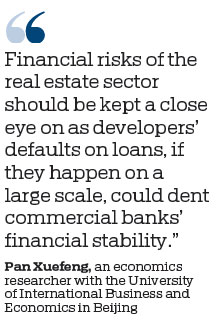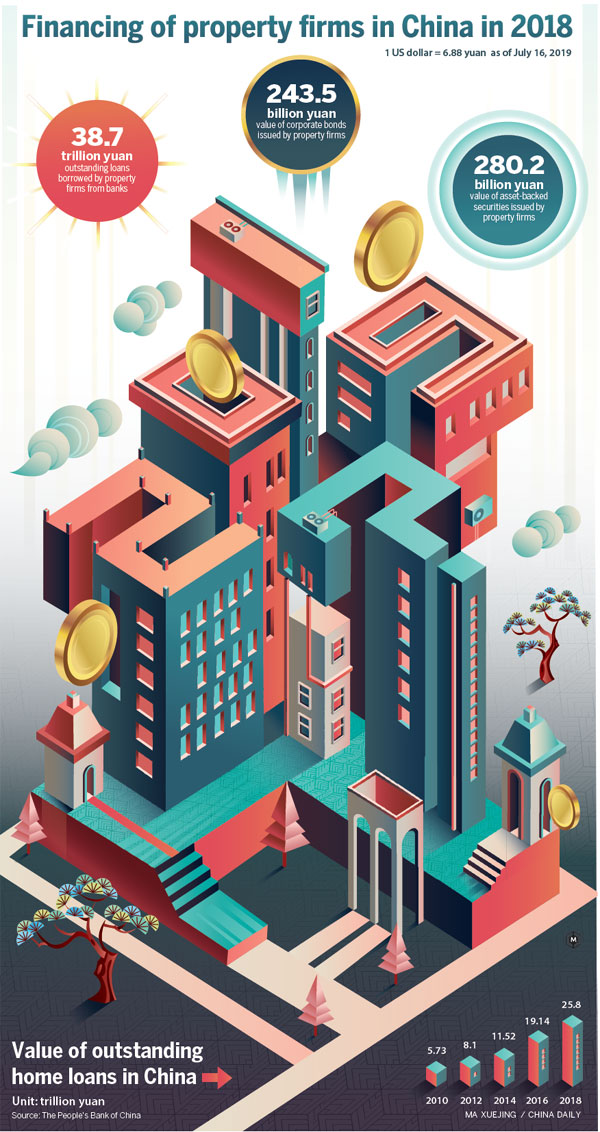Realty check: Leverage is under control
Solid fundamentals, tight regulations, sales pickup shield indebted property industry from default risks
China's real estate industry may be staring at what some may label as a monstrous financial problem.
According to estimates of the Evergrande Research Institute, real estate developers in China will need to repay debts of 6.1 trillion yuan ($887.4 billion) this year and 5.9 trillion yuan in 2020.
What's causing concern in some, not all, financial circles is that both these figures are more than double that last year (2.9 trillion yuan).
Such staggering indebtedness may ring alarm bells anywhere else in the world, but in China, there's no panic, only cautious optimism, experts said.
How come? Any financial risks that may arise from high leverage of China's real estate industry would be kept under control as the fundamentals of the property market remain rock solid and the necessary financing regulations are in place, they said.
Supervision over new forms of leveraging channels, however, should be strengthened, they said.

Leverage refers to the amount of debt a firm uses to finance assets. In the context of a property firm, high leverage would mean its projects have more debt, mostly in the form of bank loans, than equity.
When a property firm borrows heavily to build new projects, but is unable to repay in time due to poor financials, or paucity of buyers, or sluggish sales, or other market forces, it will likely default. That is a potential financial landmine as it could spark systemic risks, given the pivotal role of commercial banks in a financial system.
Financial risks of the real estate sector are also reflected in the rapidly rising mortgages of Chinese families. From 2008 to 2018, China's outstanding amount of residential mortgages surged from 3 trillion yuan to 25.8 trillion yuan, pushing up the household debt-to-GDP ratio to 53.2 percent by the end of last year, according to the People's Bank of China, the central bank, and the Chinese Academy of Social Sciences.
But related risks are still controllable as the ratio is still below the global average level of more than 60 percent and far below the approximately 95 percent in the United States on the eve of 2008 subprime mortgage crisis, analysts said, adding that it is still necessary to rein in the growing residential mortgage burden.
Since the beginning of this year, increasing indebtedness of the real estate industry has caused concern among top regulators.
Guo Shuqing, the People's Bank of China's Party secretary and head of the China Banking and Insurance Regulatory Commission, told a forum last month: "We must face the problem of the financialization of real estate in some places."
Excessive financing of the real estate industry not only strains credit resources that could be channeled into other industries but encourages speculative investment in properties, blowing the property bubble larger, Guo said.
His comments marked at least the fifth time this year that top regulators underlined financial risks of the real estate sector in the public domain.
"Financial risks of the real estate sector should be kept a close eye on as developers' defaults on loans, if they happen on a large scale, could dent commercial banks' financial stability," said Pan Xuefeng, an economics researcher with the University of International Business and Economics in Beijing.
Chinese real estate developers had relied on high leverage, mainly in terms of loans, to expand their businesses for years, with their debt-to-asset ratio stabilizing at about 80 percent in recent years, said Pan.
"Default risks would emerge on expectation of falling property prices, which would weigh on property sales and thus developers' solvency."
Default risks may intensify as the amount of due debts is expected to peak this year and the next.
Repayment pressure forced some developers, mainly small and medium-sized ones, to sell assets and even declare bankruptcy.
Meanwhile, debt defaults made the Anhui province-based Zhonghong Holding Co Ltd the first real estate enterprise to be delisted from the A-share market last year.
"It cannot be discounted that some small and medium-sized developers that typically face fewer channels and higher costs of financing, will default as financing conditions tighten to curb speculation," said Edwin Chen, a real estate analyst with UBS Securities. "But I don't consider it a systemic risk."
Chen highlighted healthier fundamentals of the real estate sector compared with several years ago. They, he said, will help shield the sector from financial risks.
"Property inventory has declined and sales have quickened. The market has a relatively satisfactory liquidity condition, which means that the developers facing repayment pressure could tide over difficulties by selling assets to others."
"Listed property firms' financial stability has improved," Chen said, adding that strong industry players with higher efficiency and anti-risk capacity are expected to squeeze out or acquire weaker competitors, ushering the real estate industry into a high-quality development stage.
Moreover, market expectation of stable housing prices will help both curb further speculative borrowing and avoid widespread sluggish sales, Chen said. That's partly because of the regulatory principle that "houses are for living, not for speculation", initiated at the end of 2016.
During the first quarter of this year, outstanding yuan-denominated loans to the real estate market increased by 1.82 trillion yuan, accounting for 31.4 percent of the country's total increment of outstanding loans, down by 8.5 percentage points from the whole year of 2018, according to the PBOC.
New home prices in four first-tier cities edged up 0.2 percent from the previous month in June, and those in 31 second-tier cities also saw a growth of 0.8 percent, indicating the stability of property sales, according to the National Bureau of Statistics.
Chen Qianghua, management partner of global property investment fund of funds at Beijing-based CreditEase Wealth Management, said the policy stance of facilitating the repayment of existing debts will also help mitigate default risks.
Financing costs of the majority of bonds issued by real estate enterprises in the first quarter were below 9 percent, indicating generally stable refinancing costs, especially for quality developers, Chen said. "The cost and difficulty of refinancing is the top focus for preventing default risks."
From the perspective of banks, financial risks of the real estate sector are also controllable as their non-performing loan ratio is at a relatively low level for loans extended to the real estate sector, Pan said.
High capital adequacy of major commercial banks could also help, he stressed.
Despite the overall controllable risks, Pan underlined the need for monitoring and reining in speculative money flowing into the real estate sector via non-banking channels in the second half of the year.
"As regulations on bank loans tightened, some real estate enterprises resorted to other leveraging channels, such as trust companies that do not comply with related regulations."
During the January-June period, trust companies raised more than 360 billion yuan to invest in the real estate sector, nearly 40 percent of total funds raised by trust companies, according to data compiled by trust industry information provider Use.
Regulators have stepped up efforts to tackle potential speculative investment, with the CBIRC recently ordering trust companies whose investment in the real estate sector had expanded excessively and quickly to contain the speed and improve risk management.
"Other forms of illegal borrowing may emerge, so it is necessary to thoroughly investigate and supervise all kinds of leveraging tools of the real estate enterprises," Pan said.
Yan Yuejin, director of the Shanghai-based E-house China Research and Development Institution, called for mechanisms to detect if bank loans given to small businesses are somehow channeled into the property market.
Regulators are expected to continue to tighten the overall financing ecosystem of the real estate enterprises in the third quarter, but the policy stance may loosen a bit in the fourth quarter, Yan said.
Ren Xiaojin contributed to this story.
zhoulanxv@chinadaily.com.cn

(China Daily Global 07/22/2019 page8)


















